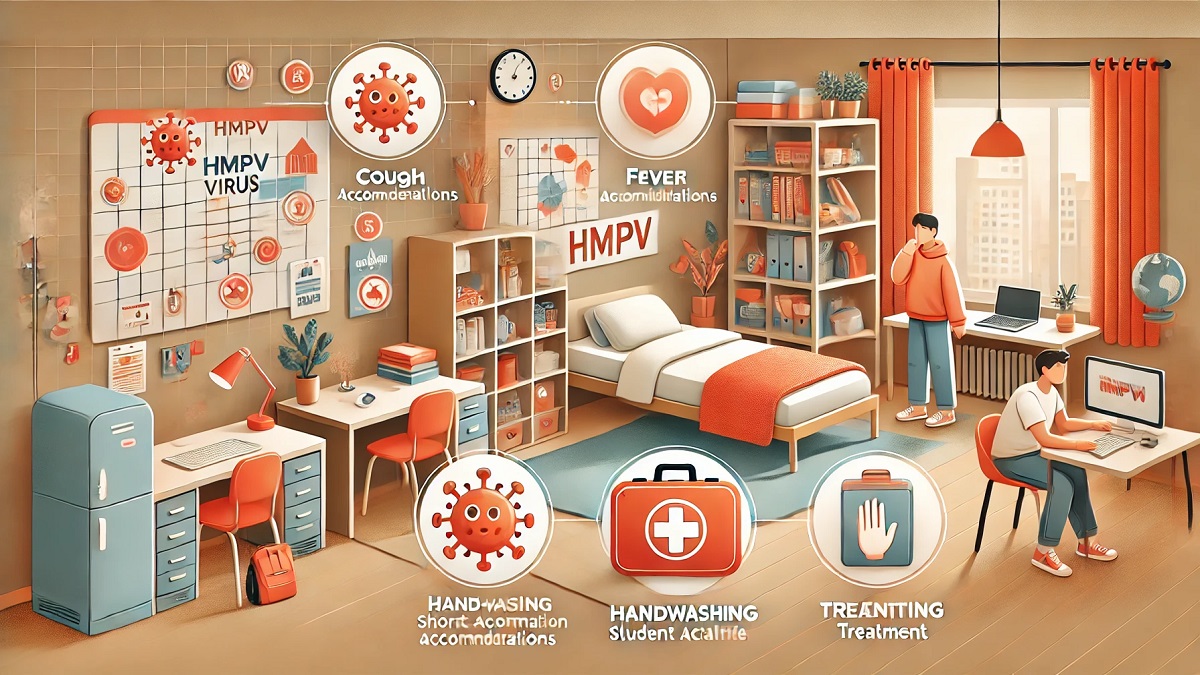Life abroad comes with plenty of challenges from moving to a new country and settling in student accommodation. As much as studying abroad is an exciting journey, with recent outbreak news, does raise some alarm.
With respiratory illnesses like the Human Metapneumovirus (HMPV) gaining attention, it is a concern for students. International students living in short-term student accommodation may find it difficult. Hence, it is essential to know as much as possible about the symptoms, treatments, preventive measures, and more. So, before you make a move to a new country, know what is happening around the world. Let’s explore it further!
What is HMPV?
HMPV stands for human metapneumovirus which is a respiratory virus. This virus causes symptoms like flu, etc which is common in colder months. Spreading through respiratory droplets, shared areas, and contaminated surfaces. For instance, you might find it in communal living spaces like student accommodation or cafes which become a hotspot for transmission.
With the recent outbreak, HMPV virus can affect anyone but it is quite common in children and youth. However, students living in flexible student accommodation are at higher risk due to frequent moving. In short, it is essential to understand its symptoms and preventive measures, especially to ensure a healthy life.
Common Symptoms of the HMPV Virus
Since you know it is a respiratory virus that is communicable, you must recognize its symptoms. To get timely treatment and recovery, here are the common symptoms of the HMPV virus:
- Fever
- Cough
- Runny or Stuffy Nose
- Sore Throat
- Fatigue and Weakness
- Shortness of Breath
- Wheezing (in severe cases)
The intensity of the symptoms ranges from person to person. Individuals with pre-existing respiratory conditions are at a higher risk for pneumonia or bronchitis.
Why Students in Short-Term Student Accommodation Should be Vigilant?
Students living in flexible and affordable student housing often share common areas, bedrooms, study spaces, and more. This often increases the risk of illness or exposure to viruses like HMPV. In addition, students who travel frequently or shift between shared student apartments are more prone to such viruses.
While short-term student accommodations are convenient and flexible, students need to be careful about hygiene and health. As a result, try to live in an accommodation that follows strict health guidelines and cleanliness protocols.
Treatment for HMPV
Given the recent reports, there is no specific antiviral treatment or vaccine for the HMPV virus at present. However, the symptoms are manageable with proper care. Some of the common treatments include:
- Rest and Hydration: If you start facing the symptoms, give your body plenty of rest and drink fluids like water, juices, electrolytes, etc to stay hydrated.
- Fever and Pain Management: There are a few medications like paracetamol, ibuprofen and Dolo 650 which help to reduce fever and ease aches.
- Steam: For flu, it is better to inhale a stream that relieves nasal congestion and soothes the respiratory tract.
- Seek Medical Attention: It is better to take precautions but if your condition worsens, consult a professional. Severe cases like pneumonia or bronchitis require medical attention like oxygen or hospitalization.
As for students living in student housing, you must inform your accommodation provider about your health. This is important as student accommodation has ways to provide basic yet necessary support like isolation facilities and more.
Ways to Prevent HMPV in Short-Term Student Accommodation
There is a saying that precaution is always better than a cure. Here are some ways and tips to protect yourself while living in student apartments:
- Maintain Personal Hygiene: First, wash your hands frequently and avoid touching your face, especially nose, eyes & mouth. Plus, you can use hand sanitizers with 60% alcohol content.
- Keep Your Space Hygienic: Clean space never attracts germs. So, disinfect surfaces and common spaces like door handles, desks, etc. Also, clean your bedding and towels regularly.
- Use Masks: Make sure to wear a mask in crowded or poorly ventilated areas. This helps to minimize the spread of respiratory droplets.
- Choose Verified Student Accommodation: Before you finalize long-term or short-term student accommodation, check for cleanliness and hygiene. Platforms like Uninist offer verified student rooms that prioritize safe and healthy living environments.
- Practice Healthy Habits: Good habits always go a long way. Boost your immunity through a good diet, sufficient sleep, and regular exercise. Also, be updated with vaccinations and flu shots which help to minimize the risk of vthe irus.
Role of Short-term Accommodation During Health Crisis
Short-term student accommodations can play a vital role during health crises like an HMPV outbreak. Here’s why:
- Flexibility: Students can quickly relocate to safer or more convenient accommodations if needed.
- Support Services: Many short-term accommodations provide on-site support, including regular cleaning and maintenance.
- Isolation Options: In case of illness, some accommodations offer isolation facilities to ensure the safety of other residents.
By choosing reliable accommodations through platforms like Uninist, students can focus on their studies while staying safe and healthy.
How Uninist Can Help
As a leading platform, we at Uninist understand every challenge students face when studying abroad, especially during a health crisis. At our platform, you can expect to find a large variety of flexible student accommodation, adhering to high hygiene standards. We verify everything about the listings to provide peace of mind for both students and their families. Be it short-term, long-term or affordable student housing, Uninist has you covered. We aim to provide safe, clean and comfortable housing options to support thrilling student life abroad.
[thfaq_group category=”category_1,category_2,etc..” limit=”-1″]



